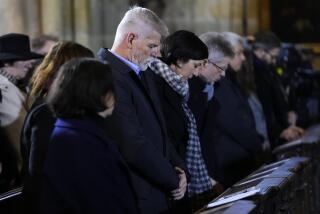Czech Democracy Spreading Roots
- Share via
Angry Czechs flooded the streets of Prague Wednesday in numbers not seen since November 1989, when massive demonstrations helped topple the Communist regime. This time demonstrators were venting frustration with the government’s attempts to manipulate the media through political appointments. Underlying the protest is growing distrust of government, an encouraging sign that freedom of the press has become an important part of the political fabric throughout Central Europe.
The catalyst for the current crisis was the pre-Christmas appointment of a new state television director, Jiri Hodac, a supporter of the conservative speaker of the lower house of parliament, Vaclav Klaus. President Vaclav Havel, a onetime dissident, sided with the strikers, as did many other public figures.
Politicians of all Czech parties have long treated state-owned television as a publicity outlet, appointing to its leadership those who reflected their interests. The appointment of Hodac was widely seen as Klaus’ attempt to gain favorable coverage of his party ahead of next year’s parliamentary election.
Clearly, the government’s interference with the media--particularly its failure to understand the role of independent news reporting in a free society--is a setback for the young democracy in the Czech Republic. But the public’s rejection of tampering with the press is a sign that democracy is taking root at the heart of Europe.
More to Read
Sign up for Essential California
The most important California stories and recommendations in your inbox every morning.
You may occasionally receive promotional content from the Los Angeles Times.













